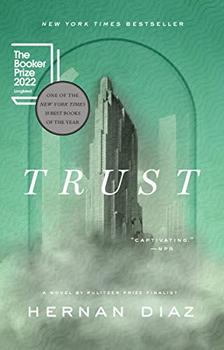Summary | Excerpt | Reading Guide | Reviews | Beyond the Book | Read-Alikes | Genres & Themes | Author Bio

Critics' Opinion:
Readers' Opinion:
First Published:
May 2022, 416 pages
Paperback:
May 2023, 416 pages
 Book Reviewed by:
Book Reviewed by:
Chloe Pfeiffer
Buy This Book
This article relates to Trust
Hernan Diaz has said about writing his novel Trust that, despite the numerous books depicting "the symptoms of wealth," "there are very, very few novels that deal with the process of accumulation of capital. This, to me, was baffling." This isn't surprising to me, as the accumulation of capital seems narratively uninteresting, at least less interesting than stories about the lives of wealthy people or the psychological wounds that keep them from appreciating their money. The accumulation of capital Diaz is talking about—investment—is not even necessarily "striking it rich." It is often having a significant amount of money in the first place and growing it, which is interesting in its perverse banality, but not exactly exciting.
If Diaz is right that the process of making and investing money tends to be less common in literature, we do see it a lot in media, in all the TV shows and movies and podcasts about tech start-ups that rely on venture capitalist funding. The Social Network touches on this aspect of the tech world, as do the TV shows Silicon Valley and Halt and Catch Fire. Three more recent TV shows tell the real-life stories of start-up founders, and their hubristic rises and falls—The Dropout (Elizabeth Holmes of Theranos, trailer below), WeCrashed (Adam Neumann of WeWork) and Super Pumped (Travis Kalanick of Uber).
But even these shows misunderstand investment, or misunderstand the nature of these "crashes" or "failures," as Malcolm Harris argues in an article for The Nation. The classic tragic arc is grafted onto the lives of the founders, but this attempt to narrativize does not fit reality: after all, two of the three are still billionaires. To grow their companies exponentially, they did not have to be particularly intelligent or creative, but simply good at spending money, good at asking for more money, and possessed of "an elite willingness to get in over their heads." The real decision-makers were the venture capitalist funds who wanted to throw money at these "fools," and even spurred them on. Of the founder of WeWork, Harris writes, "But [his benefactor] didn't invest so much because he fell for Neumann's charm; he invested so much because he had agreed to deploy $60 billion in Gulf oil money and needed places to put it." This benefactor, or another like him, would be the modern equivalent of Diaz's capitalist character Andrew Bevel—he has a lot of money and he needs to choose a place to put it in order for it to grow, and it grows partly because he has put it there. The real story is not the recognizable one of a young, energetic techie. It is something more shadowy and less digestible, and it is closer to what Diaz is trying to depict in his novel.
The machinations that wealthy people and institutions use to grow their wealth are inextricable from other aspects of life and culture. We can see it with Marvel—these juggernaut movies are so many, so long and so glutted with funding because they are a place for investors to store their money and get a good return on their investment. Attempting to depict this investment process and its cultural significance in literature as Diaz does seems noble, despite or because of how unflashy it can be, and how difficult it can be to give it shape.
Filed under Cultural Curiosities
![]() This "beyond the book article" relates to Trust. It originally ran in May 2022 and has been updated for the
May 2023 paperback edition.
Go to magazine.
This "beyond the book article" relates to Trust. It originally ran in May 2022 and has been updated for the
May 2023 paperback edition.
Go to magazine.


The Flower Sisters
by Michelle Collins Anderson
From the new Fannie Flagg of the Ozarks, a richly-woven story of family, forgiveness, and reinvention.

The House on Biscayne Bay
by Chanel Cleeton
As death stalks a gothic mansion in Miami, the lives of two women intertwine as the past and present collide.

The Funeral Cryer by Wenyan Lu
Debut novelist Wenyan Lu brings us this witty yet profound story about one woman's midlife reawakening in contemporary rural China.
Your guide toexceptional books
BookBrowse seeks out and recommends the best in contemporary fiction and nonfiction—books that not only engage and entertain but also deepen our understanding of ourselves and the world around us.